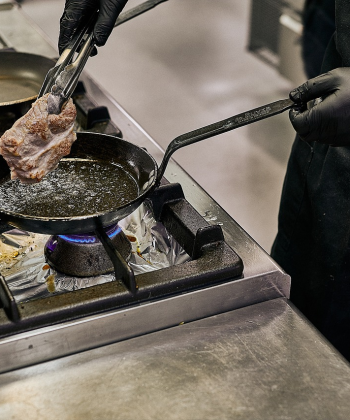A high-performing restaurant team is crucial for success. It enhances your restaurant’s reputation and boosts customer satisfaction. When setting up such a team, the key areas to focus on are Recruitment, Training, and Retention.
Recruitment helps you find the right talent. Training, including specialized programs from restaurant coaching, ensures your team performs well, while retention keeps your best employees engaged, guaranteeing long-term success. Master these strategies and you can build a successful team.
In this blog, we’ll explore how effectively implementing these key components can play a role in your training efforts.
Recruitment
Building a high-performing restaurant team starts with strategic recruitment. This process involves finding individuals who possess the necessary skills and align with your restaurant’s values and culture.
Here’s a detailed guide to help you recruit the best candidates.
Defining the Ideal Candidate
- Passion for the Industry: Seek individuals with a genuine passion for the restaurant industry. Passion often translates into energy and dedication, which can be more valuable than experience alone.
- Strong Work Ethic: Look for candidates who demonstrate reliability and a commitment to their work.
- Teamwork Abilities: Ensure candidates can work well with others and positively contribute to the team.
- Alignment with Vision and Values: Candidates should align with your restaurant’s vision, values, and culture to integrate smoothly and contribute positively to the team.
Recruitment Strategies
Strategy #1 – Clear Job Roles and Responsibilities
Define job roles and responsibilities clearly. Specify the skills and attributes required to attract suitable candidates.
Strategy #2 – Diverse Recruitment Channel
Use various channels to reach potential candidates:
- Job Boards: Post listings on popular job boards.
- Social Media: Leverage social media platforms to find candidates.
- Referrals: Motivate present staff members to recommend eligible applicants.
- Job Fairs: Attend job fairs, including those hosted by restaurant coaching and schools, to connect with job seekers.
Strategy #3 – Thorough Selection Process
Implement a comprehensive selection process:
- Behavioral Interviews: Assess how candidates have handled situations in the past.
- Skill Assessments: Evaluate relevant technical skills.
- Cultural Fit: Determine alignment with your restaurant’s values and team dynamics.
Utilizing Technology
#1 – Online Platforms and ATS
Use online job portals, social media, and applicant tracking systems (ATS) to streamline recruitment and manage applications efficiently.
#2 – Collaboration with Restaurant Schools:
Build partnerships with restaurant schools to access a pool of skilled candidates. These schools often produce well-trained individuals eager to start their careers in the industry.
#3 – Collaboration with Restaurant Coaching:
Utilize restaurant coaching programs as a source of fresh talent. Engaging with these programs can help you find candidates ready to contribute effectively to your restaurant.
Moreover, you can also use restaurant coaching to improve your recruitment efforts and ensure your team is well-prepared for the industry’s demands.
Training
Success in the restaurant industry depends on a skilled and motivated team. This guide focuses on recruitment, training, and retention strategies.
Let’s see how to build a strong team with effective onboarding, essential skills training, customer service excellence, and ongoing development:
Comprehensive Onboarding
Start new hires with a solid foundation through comprehensive onboarding. Include orientation programs to introduce them to restaurant policies and workplace culture. Ensure they understand their roles and expectations from the beginning.
Skills Training
It’s important to help your staff learn the skills they need to do their jobs well. Whether they’re serving customers, cooking food, or managing the restaurant, make sure they know what they’re doing.
Let them practice what they’ve learned by working alongside experienced staff. This holistic approach helps them learn faster and feel more confident.
Customer Service Excellence
Emphasize customer service in training. Teach staff how to handle various customer interactions and situations. Stress the importance of delivering excellent guest experiences to build customer loyalty.
Ongoing Education
Promote ongoing education with regular workshops and training sessions. Assist employees in obtaining certifications and continuing education.
Collaborate with the best restaurant coaching programs for training that can enhance your team’s skills and provide relevant certifications. This can ensure that your staff is equipped with the latest industry knowledge and demonstrate your commitment to team skil development.
Training Talent
Invest in your employees’ education and training to boost output and work happiness.
Use various methods, such as on-the-job training, online courses, workshops, and mentoring. Tailor training to individual needs and provide regular feedback and recognition.
Consistent Training Updates
Keep staff informed of industry changes with regular training updates. This ensures they stay current with new trends, menu items, and safety protocols.
Soft Skills Development
Help your staff develop important people skills, such as problem-solving, teamwork, and interacting with customers. Practice these skills in real-life situations to improve their work.
Role-Playing Exercises
Role-playing can help your staff learn how to deal with picky customers, busy rushes, or unexpected problems. It’s like a dress rehearsal for real life, helping them feel more confident and ready for anything.
Cross-Training Opportunities
Encourage employees to learn multiple roles. If someone calls in sick or you get really busy, you can easily switch people around. It helps everyone learn new skills and ensures your restaurant can handle anything.
Crisis Management Training
Teaching your staff how to handle emergencies. Practice what to do in these situations with realistic training so that everyone knows what to do if something unexpected happens.
Continuous Learning Culture
Encourage self-improvement to create a culture that values continuous development. Provide resources and support for ongoing development to create a learning-focused environment.
Customized Training Content
Tailor your restaurant’s training content to meet the specific needs of different roles. Ensure training is relevant and practical for each staff member, from chefs to servers.
Gamification for Engagement
Incorporate gamification into training to make it engaging. Use interactive games and quizzes to boost motivation and make learning enjoyable.
Development Programs
Investing in your employees is a great way to keep them happy and improve your restaurant. Offer training programs to help them learn new things and improve their jobs. Support professional certifications and further education to show commitment to employee success.
Retention
Retention is essential for maintaining a high-performing restaurant team. To keep your talented employees, focus on creating a supportive work environment, recognizing and rewarding their efforts, and offering clear growth opportunities.
These strategies help ensure your team remains engaged and committed to their roles.
Creating a Positive Work Environment
Ensure your work environment is supportive and inclusive. Pay attention to employee feedback and involve them in the decision-making process. This approach helps retain staff and builds a respectful culture.
Promote teamwork and open communication. Regular team meetings and effective communication help address issues early and maintain team cohesion.
Recognition and Rewards
Implement programs to acknowledge and reward outstanding performance. Celebrate achievements publicly and privately to boost morale.
Offer rewards like bonuses or extra time off. Consider non-monetary rewards, such as additional training or flexible work options.
Career Growth Opportunities
Provide career paths and growth opportunities within the restaurant. This clarity helps employees see a future with the company.
Prioritize internal promotions. This approach shows that you value your current team and are willing to provide them with advancement opportunities.
Work-Life Balance
Offer flexible schedules or customizable timings to help employees balance their personal and work lives.
Provide resources for managing stress and promoting self-care. Show understanding towards employees’ commitments.
Performance Management and Feedback
Give regular feedback to track progress and identify areas for improvement. Use performance management tools to monitor and address training gaps.
Conduct reviews to assess progress and recognize achievements. Help employees meet their goals.
Empowerment and Trust
Allow employees to make decisions and take ownership of their roles. Encourage them to contribute ideas and solutions.
You should also demonstrate trust in employees’ abilities. Supporting their autonomy increases job satisfaction and productivity.
Team Building and Culture
Organize activities to strengthen team relationships and improve collaboration. Create a culture of respect and support where every team member feels valued.
Leadership and Role Models
Model the values and behaviors you expect from your team. Offer guidance to help employees navigate challenges and develop their skills.
Adaptability and Resilience
Equip your team to handle changes, such as new technology or shifts in customer preferences. Support employees in managing and adapting to challenges effectively.
Presenting Your Restaurant as a Great Place to Work
Showcase your restaurant’s strengths and benefits, including career development opportunities.
Key Takeaway
Building a successful restaurant team requires focusing on three key areas: recruitment, training, and retention. Streamline the hiring process and practice effective techniques for the best results.
By consistently applying these strategies and leveraging resources like restaurant coaching, you can achieve a thriving restaurant operation and ensure long-term success.



